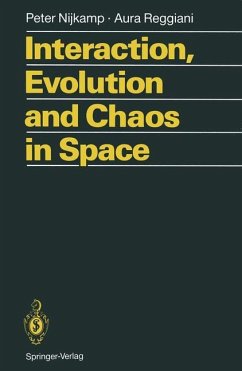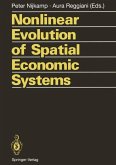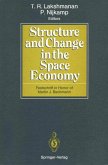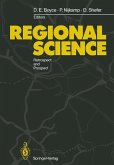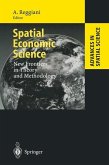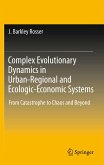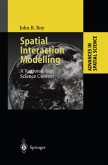- Broschiertes Buch
- Merkliste
- Auf die Merkliste
- Bewerten Bewerten
- Teilen
- Produkt teilen
- Produkterinnerung
- Produkterinnerung
For many decades scholars from various disciplines have been intrigued by the question whether there are unifying principles or models that have a validity in different disciplines. The building of such analytical frameworks bridging the gaps between scientific traditions is a very ambitious task and has not been very successful up till now. In the past - in a static context - several such principles have been defined and advocated at the edge of the natural sciences on the one hand and social sciences (in particular, economics and geography) on the other hand, mainly based on the paradigm of…mehr
Andere Kunden interessierten sich auch für
![Nonlinear Evolution of Spatial Economic Systems Nonlinear Evolution of Spatial Economic Systems]() Nonlinear Evolution of Spatial Economic Systems77,99 €
Nonlinear Evolution of Spatial Economic Systems77,99 €![Structure and Change in the Space Economy Structure and Change in the Space Economy]() Structure and Change in the Space Economy77,99 €
Structure and Change in the Space Economy77,99 €![Regional Science Regional Science]() Regional Science77,99 €
Regional Science77,99 €![Spatial Economic Science Spatial Economic Science]() Spatial Economic Science37,99 €
Spatial Economic Science37,99 €![Complex Evolutionary Dynamics in Urban-Regional and Ecologic-Economic Systems Complex Evolutionary Dynamics in Urban-Regional and Ecologic-Economic Systems]() J. Barkley RosserComplex Evolutionary Dynamics in Urban-Regional and Ecologic-Economic Systems117,99 €
J. Barkley RosserComplex Evolutionary Dynamics in Urban-Regional and Ecologic-Economic Systems117,99 €![Spatial Interaction Modelling Spatial Interaction Modelling]() John R. RoySpatial Interaction Modelling74,99 €
John R. RoySpatial Interaction Modelling74,99 €![The Economics of Networks The Economics of Networks]() The Economics of Networks74,99 €
The Economics of Networks74,99 €-
-
-
For many decades scholars from various disciplines have been intrigued by the question whether there are unifying principles or models that have a validity in different disciplines. The building of such analytical frameworks bridging the gaps between scientific traditions is a very ambitious task and has not been very successful up till now. In the past - in a static context - several such principles have been defined and advocated at the edge of the natural sciences on the one hand and social sciences (in particular, economics and geography) on the other hand, mainly based on the paradigm of 'social physics'. Some important contributions to the integration of the spatial systems sciences and physics can be found in gravity theory and entropy theory, which have formed the comer stones of interaction models in space. This book is about spatial interaction models. It describes the origin, the history and the correspondence of such models from a 'social physics' perspective. It is emphasized that such models need a clear behavioural underpinning as a sine qua non for a valid use in spatial systems analysis. This view also explains the use of micro-based disaggregate choice models as a tool for analyzing spatial systems. This is mainly analyzed in Part A of this book.
Produktdetails
- Produktdetails
- Verlag: Springer, Berlin
- Softcover reprint of the original 1st ed. 1992
- Seitenzahl: 296
- Erscheinungstermin: 28. Januar 2012
- Englisch
- Abmessung: 242mm x 170mm x 17mm
- Gewicht: 511g
- ISBN-13: 9783642775116
- ISBN-10: 364277511X
- Artikelnr.: 36116483
- Verlag: Springer, Berlin
- Softcover reprint of the original 1st ed. 1992
- Seitenzahl: 296
- Erscheinungstermin: 28. Januar 2012
- Englisch
- Abmessung: 242mm x 170mm x 17mm
- Gewicht: 511g
- ISBN-13: 9783642775116
- ISBN-10: 364277511X
- Artikelnr.: 36116483
Peter Nijkamp is Professor in Regional and Urban Economics and in Economic Geography at the VU University, Amsterdam. His main research interests cover quantitative plan evaluation, regional and urban modelling, multicriteria analysis, transport systems analysis, mathematical systems modelling, technological innovation, entrepreneurship, environmental and resource management, and sustainable development. In the past years he has focussed his research in particular on new quantitative methods for policy analysis, as well as on spatial-behavioural analysis of economic agents. He has a broad expertise in the area of public policy, services planning, infrastructure management and environmental protection. In all these fields he has published many books and numerous articles.
In 1996, he was awarded the most prestigious scientific prize in the Netherlands, the Spinoza award.
In 1996, he was awarded the most prestigious scientific prize in the Netherlands, the Spinoza award.
A Static Models of Spatial Interaction.- 1. Spatial Interaction Models and Gravity Theory a Concise Overview.- 1.1 Introduction.- 1.2 Gravity Analysis and Spatial Interaction Models.- 1.3 Gravity Theory and the Social Sciences.- 1.4 Alternative Utility Foundations and Specifications of Gravity Theory.- 1.4.1 Simple interaction theory.- 1.4.2 System-wide cost efficiency.- 1.4.3 Aggregate utility theory.- 1.5 The Scope of Gravity Models: Concluding Remarks.- 2. Entropy Theory and Spatial Interaction Analysis.- 2.1 Prologue.- 2.2 Entropy Theory and Spatial Interaction.- 2.3 Alternative Specifications of the Entropy Model.- 2.4 Alternative Theoretical Backgrounds of the Entropy Model.- 2.4.1 An economic utility approach.- 2.4.2 A probabilistic utility approach.- 2.4.3 Statistical information theory.- 2.4.4 Bayesian statistics.- 2.4.5 Maximum likelihood approach.- 2.5 Concluding Remarks.- 3. Entropy and Generalized Cost Minimization Models at the Macro Level.- 3.1 Prologue.- 3.2 Entropy and Linear Programming.- 3.3 Entropy and Geometric Programming.- 3.4 Spatial Patterns of Entropy and Linear Programming Models.- 3.5 Entropy Revisited.- 3.6 Concluding Remarks.- Annex 3A. Relationships Between Total Trip Costs and the Cost Friction Coefficient.- 4. Spatial interaction models and utility maximizing Behaviour at the micro level.- 4.1 Prologue.- 4.2 Spatial Interaction Behaviour and Individual Choice Behaviour: Theory.- 4.2.1 Introduction.- 4.2.2 Spatial interaction models and deterministic utility theory.- 4.2.3 Spatial interaction models and random utility theory.- 4.2.3.1 Basic concepts of random utility theory.- 4.2.3.2 Analogies between spatial interaction models and discrete choice models.- 4.2.4 Concluding remarks.- 4.3 Spatial Interaction Behaviour and Individual Choice Theory: An Application.- 4.3.1 Introduction.- 4.3.2 The model.- 4.3.3 The data.- 4.3.4 Results and concluding remarks.- 4.4 Conclusions.- Annex 4A. An Algorithm for Modal Split Choice with Congestion.- B Dynamic Models of Spatial Interaction.- 5. Dynamic and Stochastic Spatial Interaction Models.- 5.1 Prologue.- 5.2 Spatial Interaction Models Analyzed by Means of Optimal Control.- 5.2.1 Introduction.- 5.2.2 An optimal control approach.- 5.2.3 Concluding remarks.- 5.3 Spatial Interaction Models Analyzed by Means of Stochastic Optimal Control.- 5.3.1 Introduction.- 5.3.2 A stochastic optimal control approach.- 5.3.3 Concluding remarks.- 5.4 Spatial Interaction Models with Catastrophe Behaviour Analyzed in the Framework of Stochastic Optimal Control.- 5.4.1 The model.- 5.4.2 The stochastic optimal control version.- 5.5 Epilogue.- Annex 5A. The Generalized Spatial Interaction Model as a Solution to the Optimal Control Entropy Model.- Annex 5B. A (Generalized) Stochastic Spatial Interaction Model as a Solution to a Stochastic Optimal Control Problem.- Annex 5C. Stability and Bifurcations in a Phase Diagram Analysis for a Stochastic Optimal Control Problem.- 6 Spatial Modelling and Chaos Theory.- 6.1 Prologue.- 6.2 Chaos Theory: A Brief Review.- 6.2.1 A general introduction to non-linear modeling.- 6.2.2 Key issues in the theory of chaos.- 6.3 Spatial Applications of Chaos Theory: A Brief Survey.- 6.3.1 Introduction.- 6.3.2 Dendrinos.- 6.3.3 Dendrinos and Sonis.- 6.3.4 Mosekilde, Aracil and Allen.- 6.3.5 Nijkamp.- 6.3.6 Reiner, Munz, Haag and Weidlich.- 6.3.7 White.- 6.3.8 Zhang.- 6.3.9 Concluding remarks.- 6.4 A Model of Chaos for Spatial Interaction and Urban Dynamics.- 6.4.1 Introduction.- 6.4.2 Results of simulation experiments.- 6.4.2.1 The onset of chaotic motion.- 6.4.2.2 Chaotic urban evolution.- 6.4.3 Concluding remarks.- 6.5 Epilogue.- Annex 6A. Classification of Two-dimensional Critical Points.- Annex 6B. Strange Attractors: A Brief Overview.- Annex 6C. Steady State Solutions for a Generalized Lorenz System.- 7. Spatial Interaction Models and Chaos Theory.- 7.1 Prologue.- 7.2 Chaos in Spatial Interaction Models.- 7.2.1 Introduction.- 7.2.2 Chaotic eleme
A Static Models of Spatial Interaction.- 1. Spatial Interaction Models and Gravity Theory a Concise Overview.- 1.1 Introduction.- 1.2 Gravity Analysis and Spatial Interaction Models.- 1.3 Gravity Theory and the Social Sciences.- 1.4 Alternative Utility Foundations and Specifications of Gravity Theory.- 1.4.1 Simple interaction theory.- 1.4.2 System-wide cost efficiency.- 1.4.3 Aggregate utility theory.- 1.5 The Scope of Gravity Models: Concluding Remarks.- 2. Entropy Theory and Spatial Interaction Analysis.- 2.1 Prologue.- 2.2 Entropy Theory and Spatial Interaction.- 2.3 Alternative Specifications of the Entropy Model.- 2.4 Alternative Theoretical Backgrounds of the Entropy Model.- 2.4.1 An economic utility approach.- 2.4.2 A probabilistic utility approach.- 2.4.3 Statistical information theory.- 2.4.4 Bayesian statistics.- 2.4.5 Maximum likelihood approach.- 2.5 Concluding Remarks.- 3. Entropy and Generalized Cost Minimization Models at the Macro Level.- 3.1 Prologue.- 3.2 Entropy and Linear Programming.- 3.3 Entropy and Geometric Programming.- 3.4 Spatial Patterns of Entropy and Linear Programming Models.- 3.5 Entropy Revisited.- 3.6 Concluding Remarks.- Annex 3A. Relationships Between Total Trip Costs and the Cost Friction Coefficient.- 4. Spatial interaction models and utility maximizing Behaviour at the micro level.- 4.1 Prologue.- 4.2 Spatial Interaction Behaviour and Individual Choice Behaviour: Theory.- 4.2.1 Introduction.- 4.2.2 Spatial interaction models and deterministic utility theory.- 4.2.3 Spatial interaction models and random utility theory.- 4.2.3.1 Basic concepts of random utility theory.- 4.2.3.2 Analogies between spatial interaction models and discrete choice models.- 4.2.4 Concluding remarks.- 4.3 Spatial Interaction Behaviour and Individual Choice Theory: An Application.- 4.3.1 Introduction.- 4.3.2 The model.- 4.3.3 The data.- 4.3.4 Results and concluding remarks.- 4.4 Conclusions.- Annex 4A. An Algorithm for Modal Split Choice with Congestion.- B Dynamic Models of Spatial Interaction.- 5. Dynamic and Stochastic Spatial Interaction Models.- 5.1 Prologue.- 5.2 Spatial Interaction Models Analyzed by Means of Optimal Control.- 5.2.1 Introduction.- 5.2.2 An optimal control approach.- 5.2.3 Concluding remarks.- 5.3 Spatial Interaction Models Analyzed by Means of Stochastic Optimal Control.- 5.3.1 Introduction.- 5.3.2 A stochastic optimal control approach.- 5.3.3 Concluding remarks.- 5.4 Spatial Interaction Models with Catastrophe Behaviour Analyzed in the Framework of Stochastic Optimal Control.- 5.4.1 The model.- 5.4.2 The stochastic optimal control version.- 5.5 Epilogue.- Annex 5A. The Generalized Spatial Interaction Model as a Solution to the Optimal Control Entropy Model.- Annex 5B. A (Generalized) Stochastic Spatial Interaction Model as a Solution to a Stochastic Optimal Control Problem.- Annex 5C. Stability and Bifurcations in a Phase Diagram Analysis for a Stochastic Optimal Control Problem.- 6 Spatial Modelling and Chaos Theory.- 6.1 Prologue.- 6.2 Chaos Theory: A Brief Review.- 6.2.1 A general introduction to non-linear modeling.- 6.2.2 Key issues in the theory of chaos.- 6.3 Spatial Applications of Chaos Theory: A Brief Survey.- 6.3.1 Introduction.- 6.3.2 Dendrinos.- 6.3.3 Dendrinos and Sonis.- 6.3.4 Mosekilde, Aracil and Allen.- 6.3.5 Nijkamp.- 6.3.6 Reiner, Munz, Haag and Weidlich.- 6.3.7 White.- 6.3.8 Zhang.- 6.3.9 Concluding remarks.- 6.4 A Model of Chaos for Spatial Interaction and Urban Dynamics.- 6.4.1 Introduction.- 6.4.2 Results of simulation experiments.- 6.4.2.1 The onset of chaotic motion.- 6.4.2.2 Chaotic urban evolution.- 6.4.3 Concluding remarks.- 6.5 Epilogue.- Annex 6A. Classification of Two-dimensional Critical Points.- Annex 6B. Strange Attractors: A Brief Overview.- Annex 6C. Steady State Solutions for a Generalized Lorenz System.- 7. Spatial Interaction Models and Chaos Theory.- 7.1 Prologue.- 7.2 Chaos in Spatial Interaction Models.- 7.2.1 Introduction.- 7.2.2 Chaotic eleme

